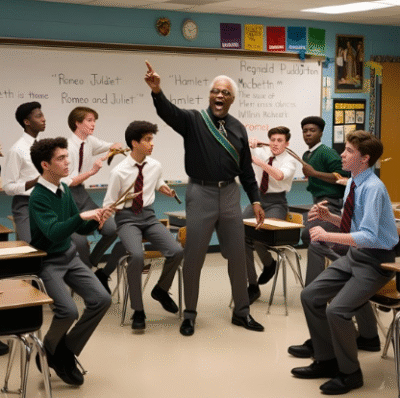In the hushed halls of Saintly Scholars Academy, English literature class was a place where creativity flourished, words came alive, and students found themselves transported to distant worlds. This was never more evident than during their latest endeavor—a theatrical exploration into the works of William Shakespeare.
Under the charismatic guidance of their passionate teacher, Mr. Reginald “Drama King” Puddington, the students embarked on an ambitious journey to bring the Bard’s legendary plays to life. Known for his exaggerated gestures and dramatic flair, Mr. Puddington had a way of making Shakespeare feel less like an intimidating relic of the past and more like an electrifying, living force in their classroom. His booming voice filled the room as he recited soliloquies with theatrical precision, inspiring his students to embrace the beauty of Shakespearean language.
The class began by diving headfirst into Shakespeare’s most celebrated works—Romeo and Juliet, Hamlet, and Macbeth. They dissected the themes woven into each play: the sweeping passion of young love, the torments of ambition, and the tragic consequences of betrayal. Mr. Puddington made sure no student was left untouched by the poetry of iambic pentameter, his enthusiasm contagious as he declared, “Once you master the rhythm, Shakespeare will sing to you!”
With scripts in hand and excitement bubbling in their hearts, the students took their first steps into the world of performance. The classroom transformed into a theatrical stage as students rehearsed monologues, experimented with stage presence, and embraced the challenge of embodying complex characters. Timid whispers soon became confident declarations, and awkward shuffles evolved into commanding movements.
Each student found their moment of glory—Sam, who initially struggled with public speaking, delivered Hamlet’s famous “To be or not to be” soliloquy with newfound conviction. Emily, reserved and quiet, stunned her classmates with a chilling performance of Lady Macbeth’s descent into madness. Even Henry, who claimed to have no interest in Shakespeare at all, couldn’t resist the thrill of playing Mercutio, delivering lines with a swagger befitting the character’s wit.
Costumes and props added another dimension to their performances. A repurposed curtain became a noble cape, plastic swords clashed in mock duels, and hastily sewn dresses gave the illusion of Elizabethan grandeur. The room buzzed with creativity as students painted backdrops and fashioned makeshift crowns fit for kings.
After weeks of preparation, their hard work culminated in a grand performance before an audience of teachers, parents, and fellow students. The classroom transformed into a theater, and as the lights dimmed, an air of anticipation filled the room. One by one, the students stepped onto the makeshift stage, delivering their lines with passion and precision. The audience gasped at dramatic turns, chuckled at well-timed comedic exchanges, and erupted into thunderous applause at the final bow.
Through the magic of theater, the students discovered more than just the brilliance of Shakespeare—they uncovered the power of language to evoke emotion, provoke thought, and create connections. They learned to project confidence, work as a team, and embrace the vulnerability that comes with expressing oneself on stage. The experience forged bonds between classmates that would endure long after the final curtain fell.
As the students left the classroom that day, carrying their scripts and lingering echoes of applause, Mr. Puddington stood proudly at the doorway, a gleam in his eye. “You’ve done Shakespeare proud,” he declared dramatically, twirling his imaginary mustache. “And more importantly, you’ve discovered something wonderful—that words, when spoken with heart, can move mountains.”
The literary legends of Saintly Scholars Academy had not only mastered the art of Shakespearean drama but had also found their voices, their confidence, and a deep appreciation for storytelling that would last a lifetime.
